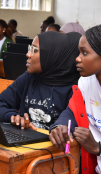Inuka! is a comprehensive youth focused community peace building action, across the coastal region of Kenya. We share with you some of the lessons learnt in implementing this project by the Search For Common Ground and Haki Africa.
- Engaging adults is necessary for impact.
Most youth projects have low engagement with non-youth actors, and this often leads to shallow results. In implementing Inuka, however, Search made a concerted effort to engage and influence adult stakeholders through specific outreach activities. This has introduced opportunities for adults eg the Magistrates have shifted their perceptions of young people presented to the courts. The probations office now has more regular conversations with young people in Vulnerable spaces. For the very first time Government officials representing the criminal Justice system had access to Banjumali Community In one of Lamu’s Island that has been in the news for Killings targeting security and government administrators, the result of which was several facilitated dialogues to address the root course of this conflict.
- Use already existing structures.
Activities that were designed to rely on already existing structures or well-established institutions were well received and incentivized buy-in from stakeholders and communities. For example, Search designed the CUC sessions to reflect the already existing CUC structures, which enabled the organization to automatically get buy-in from key Court User Committee (CUC) members. Because of this approach, justice actors felt that they owned the initiative, and this resulted in structural changes being made to the CUC.
- In implementing the project, Search employed a gendered approach in engaging with community members, where each gender was engaged separately and in a space where people felt comfortable and safe. While vulnerable young men were engaged in the maskanis, young women were engaged directly in spaces where they gathered, such as women groups or mosques. This has led to support of youth led initiatives that are gender transformative. Eg INUKA is now addressing Gender based Violence as an important Security threat for women and girls.
- In youth-led restitutions, it became clear that youth experienced harassment by police officers and they further reported neglect by government officials; as such it was necessary to inform youth about mechanisms at their disposal to seek redress.
- Engaging with justice actors and communities through combining single and multi-stakeholder dialogues works. Engaging with community members separately, then together, has proven to be a successful approach in addressing the challenges facing community members and justice actors; as it continues to be crucial to address existing misunderstandings between different groups (justice actors and communities) and build the kind of consensus that contributes to people’s perceptions of trust and security.
- Adult stakeholders, especially grass root security actors, have at times undermined the work of young people in hard to reach areas, who are trying to build peace. Thus, security forums should involve adult stakeholders and young persons at risk so that these two sides can better understand one another, reconcile and collaborate.
- There is a need for more targeted interventions to reach youth in correctional centers and others who are in conflict with the law. Inuka Has worked with Youth in Hindi prison by conducting CUC dialogues inside the prisons which resulted in very focused interventions and one young person secured his freedom soon after.
- The rolling out of the small grants for youth led initiatives got many youth groups so excited to implement peacebuilding activities. It shows that giving the responsibilities to several local youth groups to inspire peace and coexistence may deliver more positive outcomes as they will run home grown solutions to local problems.
- In Lamu County, youth are increasingly enrolling for primary, secondary technical and vocational education and training as they come to the realization that idleness increases vulnerability to radicalization and recruitment. Technical and vocational skills increase their literacy, employability skills and ability to become financially independent further reducing their vulnerability.
- The project has also recorded observable change in terms of knowledge of the criminal justice system. Communities have become more aware of the justice system and understand their legal rights. As a result, some community members have been able to defend themselves in court while others have even been able to negotiate with the magistrates to reduce bail charges. Communities have become familiar with courts and are seeking to settle serious issues in courts as opposed to the past where they feared the courts and serious cases such as defilement were settled at home.
- Youths are becoming more confident in voicing their concerns and issues to the local security actors and other duty bearers. Increasingly youth are now able to vocalize these concerns in the town hall meetings and have called on the police to use a human rights based approach. The Changamwe boda Boda community now has joint security management with the POlice and Assistant county commissioner- as a result home and business burglaries, murders and fights between the police and boda boda have significantly gone down.
- The use of art is an effective way to facilitate interactions between different groups. Use of theater performances during town hall meetings was relevant and proved to be effective to engage and build trust between adversary parties or groups in the community.
See Also





